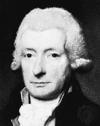- Cowper, William
-
born Nov. 26, 1731, Great Berkhamstead, Hertfordshire, Eng.died April 25, 1800, East Dereham, NorfolkBritish poet.Throughout his life he was plagued by recurring mental instability and religious doubt. Olney Hymns (1779; with John Newton), a book of devotional verse, includes hymns that are still favourites in Protestant England. The Task (1785), a long discursive poem written "to recommend rural ease," was an immediate success. He also wrote many melodious, even humorous, shorter lyrics, and he is considered one of the best letter writers in English. His work, often about everyday rural life, brought a new directness and humanitarianism to 18th-century nature poetry, foreshadowing Romanticism.
 William Cowper, detail of an oil painting by Lemuel Abbott, 1792; in the National Portrait Gallery, ...Courtesy of The National Portrait Gallery, London
William Cowper, detail of an oil painting by Lemuel Abbott, 1792; in the National Portrait Gallery, ...Courtesy of The National Portrait Gallery, London* * *
▪ British poetborn Nov. 26, 1731, Great Berkhamstead, Hertfordshire, Eng.died April 25, 1800, East Dereham, Norfolkone of the most widely read English poets of his day, whose most characteristic work, as in The Task or the melodious short lyric “The Poplar Trees,” brought a new directness to 18th-century nature poetry.Cowper wrote of the joys and sorrows of everyday life and was content to describe the minutiae of the countryside. In his sympathy with rural life, his concern for the poor and downtrodden, and his comparative simplicity of language, he may be seen as one in revolt against much 18th-century verse and as a forerunner of Robert Burns, William Wordsworth, and Samuel Taylor Coleridge. While he is often gently humorous in his verse, the sense of desolation that was never far below the surface of his mind is revealed in many of his poems, notably “The Castaway.”After the death of his mother when he was six, Cowper (pronounced “Cooper”), the son of an Anglican clergyman, was sent to a local boarding school. He then moved to Westminster School, in London, and in 1750 began to study law. He was called to the bar in 1754 and took chambers in London's Middle Temple in 1757. During his student days he fell in love with his cousin, Theodora Cowper, and for a while the two were engaged. But Cowper was beginning to show signs of the mental instability that plagued him throughout his life. His father had died in 1756, leaving little wealth, and Cowper's family used its influence to obtain two administrative posts for him in the House of Lords, which entailed a formal examination. This prospect so disturbed him that he attempted suicide and was confined for 18 months in an asylum, troubled by religious doubts and fears and persistently dreaming of his predestined damnation.Religion, however, also provided the comfort of Cowper's convalescence, which he spent at Huntingdon, lodging with the Reverend Morley Unwin, his wife Mary, and their small family. Pious Calvinists, the Unwins supported the evangelical revival, then a powerful force in English society. In 1767 Morley Unwin was killed in a riding accident, and his family, with Cowper, took up residence at Olney, in Buckinghamshire. The curate there, John Newton, a leader of the revival, encouraged Cowper in a life of practical evangelism; however, the poet proved too frail, and his doubt and melancholy returned. Cowper collaborated with Newton on a book of religious verse, eventually published as Olney Hymns (1779).In 1773 thoughts of marriage with Mary Unwin were ended by Cowper's relapse into near madness. When he recovered the following year, his religious fervour was gone. Newton departed for London in 1780, and Cowper again turned to writing poetry; Mrs. Unwin suggested the theme for “The Progress of Error,” six moral satires. Other works, such as “Conversation” and “Retirement,” reflected his comparative cheerfulness at this time.Cowper was friendly with Lady Austen, a widow living nearby, who told him a story that he made into a ballad, “The Journey of John Gilpin,” which was sung all over London after it was printed in 1783. She also playfully suggested that he write about a sofa—an idea that grew into The Task. This long discursive poem, written “to recommend rural ease and leisure,” was an immediate success on its publication in 1785. Cowper then moved to Weston, a neighbouring village, and began translating Homer. His health suffered under the strain, however, and there were occasional periods of mental illness. His health continued to deteriorate, and in 1795 he moved with Mary Unwin to live near a cousin in Norfolk, finally settling at East Dereham. Mrs. Unwin, a permanent invalid since 1792, died in December 1796, and Cowper sank into despair from which he never emerged.Robert Southey edited his writings in 15 volumes between 1835 and 1837. Cowper is also considered one of the best letter writers in English, and some of his hymns, such as “God Moves in a Mysterious Way” and “Oh! For a Closer Walk with God,” have become part of the folk heritage of Protestant England. The Letters and Prose Writings, in two volumes, edited by James King and Charles Ryskamp, was published in 1979–80.* * *
Universalium. 2010.
